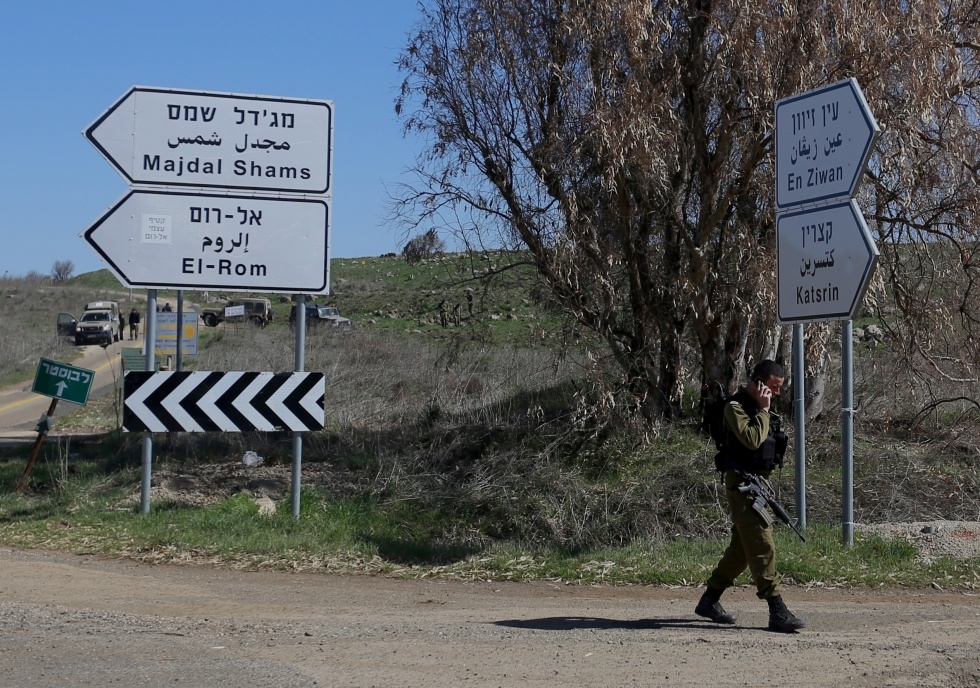Arab Israelis heading to Syria seen as 'great danger for Israel'

A young Arab Israeli who joined rebel forces in Syria and underwent military training with fighters went on trial Wednesday charged with violating Israeli law, legal and security officials said, amid fears that such youth pose 'great danger to Israel'.
Ahmad Shurbaji, 23, from Umm al-Fahm in northern Israel, along with three other Arab Israelis on 16 January left for Turkey, from where they crossed into Syria, the prosecution said.
According to the Shin Bet domestic security agency, Shurbaji was arrested upon his return to Israel on 20 April.
"In his investigation, Shurbaji admitted he went to Syria to join the struggle against the Syrian army," the Shin Bet statement read.
It said he joined the Islamic State of Iraq and the Levant (ISIL), "one of the most extreme global jihadist groups currently active in Syria".
He underwent military training with ISIL and "participated in at least two battles" against government forces as well as other actions, including on the Iraqi border, it said.
Shurbaji was charged on Wednesday at Haifa magistrate court in northern Israel with unlawfully leaving Israel and undergoing prohibited military training, the charge sheet read.
Israel is technically at war with Syria and it is illegal for its citizens to travel there.
"The phenomenon of Arab Israelis leaving for Syria represents great danger for Israel," the Shin Bet said.
It said many "hostile elements" were active in Syria and that recruits underwent military training and were "exposed to extremist jihadist ideology."
The main concern, Shin Bet said, was that Arab Israelis could be "used by terror elements to carry out military operations against Israel, or obtain information about it."
Israel shares an 80 km frontier with Syria, which cuts across the occupied Golan Heights plateau.
Syria's brutal three-year conflict occasionally spills over into the Israeli-controlled sector, which the Israel seized during the 1967 Six-Day War.
Israel's defence establishment closely monitors the ceasefire line out of concern that jihadist elements among the rebels fighting the regime could attack Israel.
US names two Syrian rebels 'global terrorists'
Meanwhile, the US government officially designated two officials of rival militant groups in Syria as "global terrorists" Wednesday, warning other Syrian rebel groups to stay away from both men.
The US Treasury added Saudi-born Abd Al-Rahman Muhammad Zafir Al-Dubaysi al-Juhni and Iraq native Abd Al-Rahman Mustafa al-Qaduli to its list of Specially Designated Global Terrorists.
The two were cited for their ties to, respectively, al-Qaeda operations in Syria, and al-Qaeda breakaway group, Islamic State of Iraq and the Levant (ISIL).
Al-Juhni is part of a group of senior al-Qaeda operatives in Syria formed to attack Western targets outside the country and also to mediate tensions between ISIL and the Al-Nusra Front, the local al-Qaeda affiliate, the Treasury said.
Al-Qaduli is a senior ISIL official who joined al-Qaeda 10 years ago and previously worked for leader Abu Musab al-Zarqawi, formerly the al-Qaeda commander in Iraq, it said.
The designation aims to limit their access to financial and business networks by banning any American or American business from dealings with them and freezing any US assets.
Treasury Under Secretary for Terrorism and Financial Intelligence David Cohen said the act sends a message to other Syrian rebels to not work with them.
"We are very concerned about al-Qaeda networks moving money and fighters to extremist groups in Syria," he said in a statement.
The action "sends a strong warning to the legitimate Syrian opposition and those who wish to support it that they must reject the attempts of al-Qaeda, ISIL, and Al-Nusra to elicit support for their cause by preying on the sympathies of the international community for the plight of the Syrian people."
Middle East Eye propose une couverture et une analyse indépendantes et incomparables du Moyen-Orient, de l’Afrique du Nord et d’autres régions du monde. Pour en savoir plus sur la reprise de ce contenu et les frais qui s’appliquent, veuillez remplir ce formulaire [en anglais]. Pour en savoir plus sur MEE, cliquez ici [en anglais].




